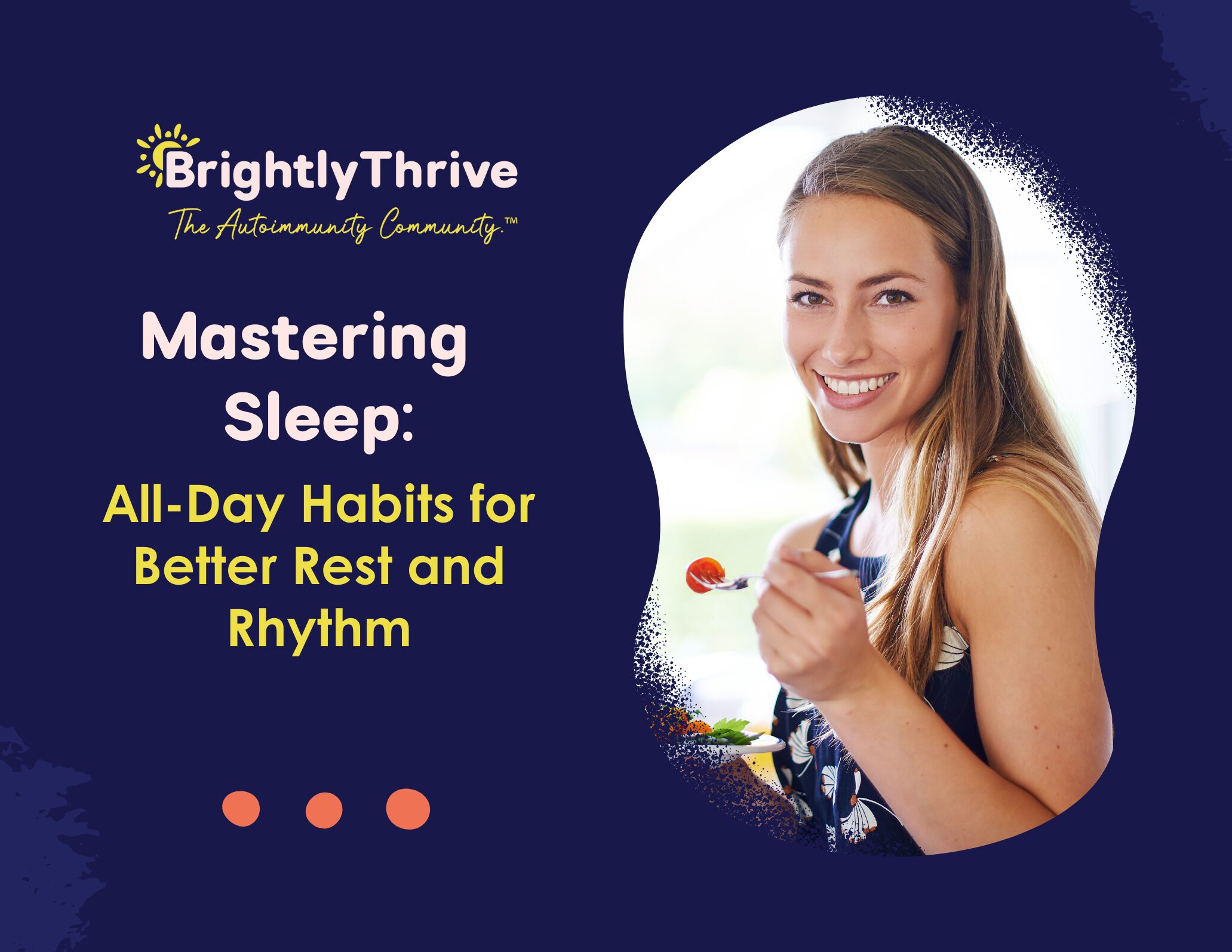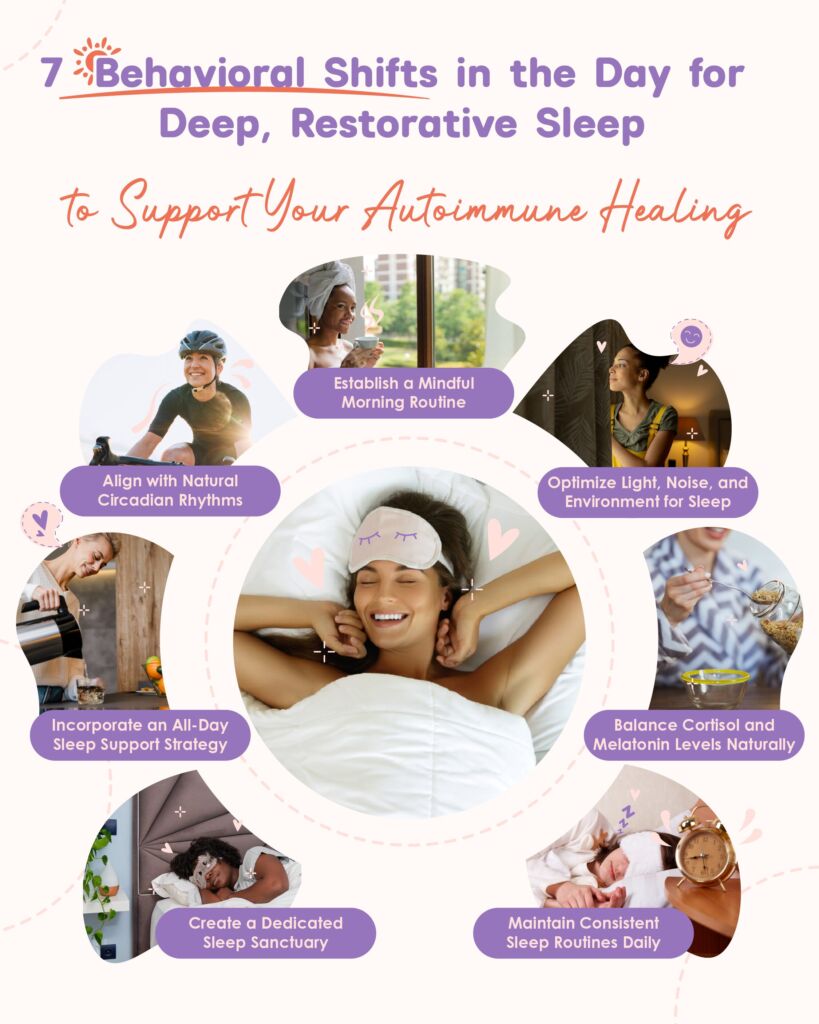
Mastering Sleep: All-Day Habits for Better Rest and Rhythm
What if the secret to better sleep and rest—crucial for managing autoimmunity—lies not just in your nighttime routine, but in EVERYTHING you do DURING THE DAY?

All-day sleep enhancement takes a holistic approach, starting the moment you wake up and flowing through every decision, habit, and environment.
ThriveGuide™ Bridget Ballesteros shares that for those managing autoimmune conditions, the way you regulate your energy and stress during the day has a profound ripple effect on your rest at night. Small, intentional shifts throughout the day could be the key to achieving the deep, restorative sleep your body needs to heal.
Here’s how:

1. Build a Strong Sleep Foundation
For all-day sleep enhancement, your foundation is everything. Autoimmunity is like a hyperactive fire alarm—it doesn’t take much to set off symptoms, and poor sleep is a major trigger.
Sleep disruptors—whether they’re blue light from screens, outside noise, or even your bedroom setup—can amplify the body’s stress response, further straining your immune system. By creating a sleep sanctuary free from these triggers, you can signal to your body that it’s time to relax, making sleep deeper and more restorative.
2. All-Day Sleep Enhancement Approach
Managing autoimmune conditions requires understanding that sleep isn’t just a nighttime concern—it’s an all-day practice.
What you eat, how you manage stress, and your level of movement during the day all impact your body’s ability to repair itself overnight. Think of it like a balance sheet: every healthy choice you make adds to your sleep bank, while poor habits drain it.
Creating a rhythm that supports your body’s healing helps set the stage for better sleep at night.
3. Align with Your Circadian Rhythm
All-day sleep enhancement revolves around aligning with your body’s natural circadian rhythm, which is especially critical for those with autoimmune conditions. When your rhythm is off, it can throw your entire immune system out of sync.
Start by exposing yourself to natural light in the morning, which tells your body it’s time to wake up and be alert. In the evening, dimming the lights signals your brain to start winding down, preparing you for a deeper sleep that supports immune function.
4. Morning Habits for Better Sleep
All-day sleep enhancement begins in the morning. Autoimmune warriors know the importance of setting the right tone for the day—early sunlight, a nourishing breakfast, and some movement are key.
These habits not only energize you but also help regulate your internal clock, making it easier to fall into deep, healing sleep when the day is done. Your morning routine is the first step toward aligning your body for nighttime recovery.
5. Control Light, Noise, and Environment
In autoimmunity, environmental stressors like light and noise can have an outsized impact on your body’s ability to rest and recover. All-day sleep enhancement means not just managing your exposure to these elements at night but throughout the day.
Dim the lights in the evening, use blackout curtains, and eliminate noise distractions—these small shifts in your environment send a clear message to your body: it’s time to calm down, relax, and let sleep do its work.
6. Regulate Cortisol and Melatonin
Autoimmunity often comes with heightened stress and inflammation, which can throw off the natural balance of cortisol and melatonin.
All-day sleep enhancement involves managing these hormones throughout the day—cortisol helps you wake up and stay alert, while melatonin guides you into rest. By reducing stressors that spike cortisol levels, and embracing routines that promote melatonin production, you’ll foster the kind of restful sleep that allows your body to heal.
7. Consistent Daily Routines for Sleep
Autoimmunity thrives on consistency—your body needs routine to stay balanced, and all-day sleep enhancement relies on that same regularity. When you stick to a consistent sleep schedule, your body knows when to sleep and when to wake.
Over time, this routine strengthens your internal rhythm, allowing you to fall asleep more easily, stay asleep longer, and wake up feeling refreshed. A simple, steady routine is one of the most powerful tools in your sleep toolkit.
Final Thoughts
All-day sleep enhancement is more than just winding down before bed—it’s about embracing the habits that nourish your body and mind from sunrise to sunset. For those managing autoimmune conditions, it’s essential to create a rhythm that supports deep, restorative sleep.

At BrightlyThrive™, we aim to empower you with the tools and community support to build that rhythm—one that nurtures your body’s natural healing process and helps you reclaim restful, rejuvenating sleep. Become a member of our community today.
Overall, ThriveGuide™ Bridget reminds us that every choice you make throughout the day—whether it’s controlling your environment or aligning with your body’s natural rhythms—sets the stage for healing. Start small, but stay consistent, and watch as your sleep transforms into the powerful tool your body needs to thrive.
References
Suni, E., & Suni, E. (2023, December 8). 20 Tips for How to Sleep Better. Sleep Foundation. https://www.sleepfoundation.org/sleep-hygiene/healthy-sleep-tips
Sleep Resources | University Health Center. (n.d.). https://health.unl.edu/sleep-resources
Antosiek, D. (2024, June 28). 20 Powerful Strategies to Reset Your Circadian Rhythm. Optimize Your Biology. https://optimizeyourbiology.com/circadian-rhythm
Thrive Global. (2023, February 22). 10 Simple Morning and Nighttime Routines to Help You Have a Good Night’s Sleep. https://community.thriveglobal.com/nighttime-routines-morning-routines-sleep-better/
5 Ways to Create an Environment that Promotes Quality Sleep. (2022, February 14). Happy Healthy Things. https://happyhealthythings.com/blog/posts/5-ways-to-create-a-bedroom-environment-that-promotes-quality-sleep
How to Balance Melatonin and Cortisol Levels. (2024, September 30). Rupa Health. https://www.rupahealth.com/post/how-to-balance-melatonin-and-cortisol-naturally-for-better-health
Rd, C. W. (2022, December 2). One Small Step: Setting a Consistent Sleep Schedule. Healthline. https://www.healthline.com/health/daytime-sleepiness/set-a-consistent-sleep-schedule
TAGS:
CATEGORIES:






